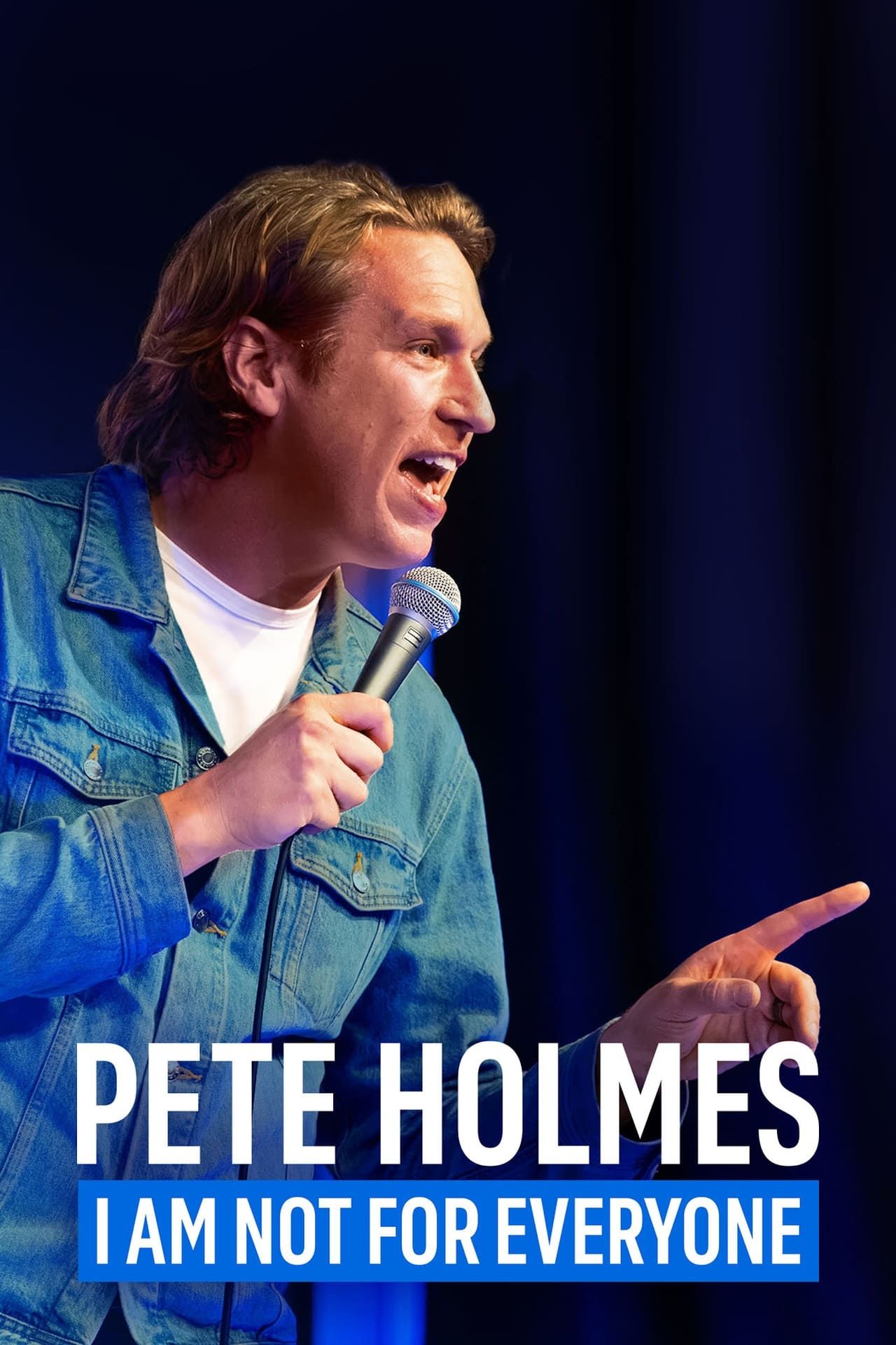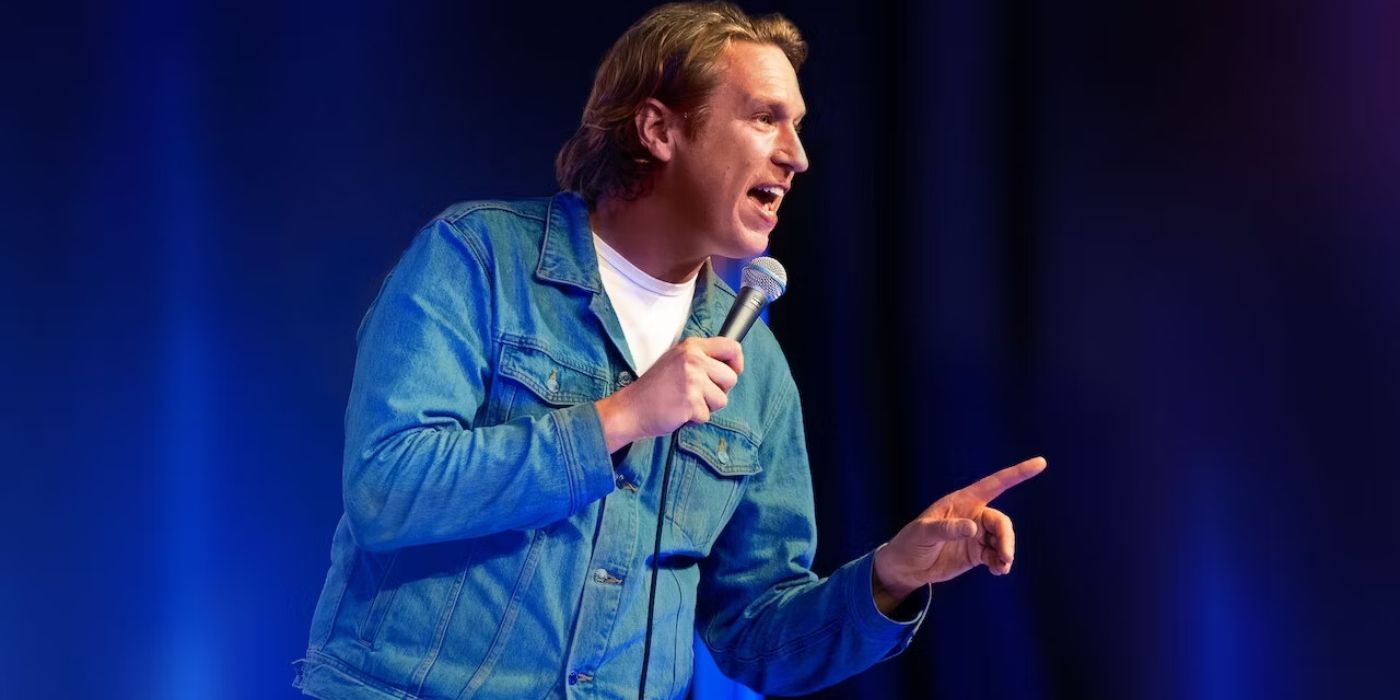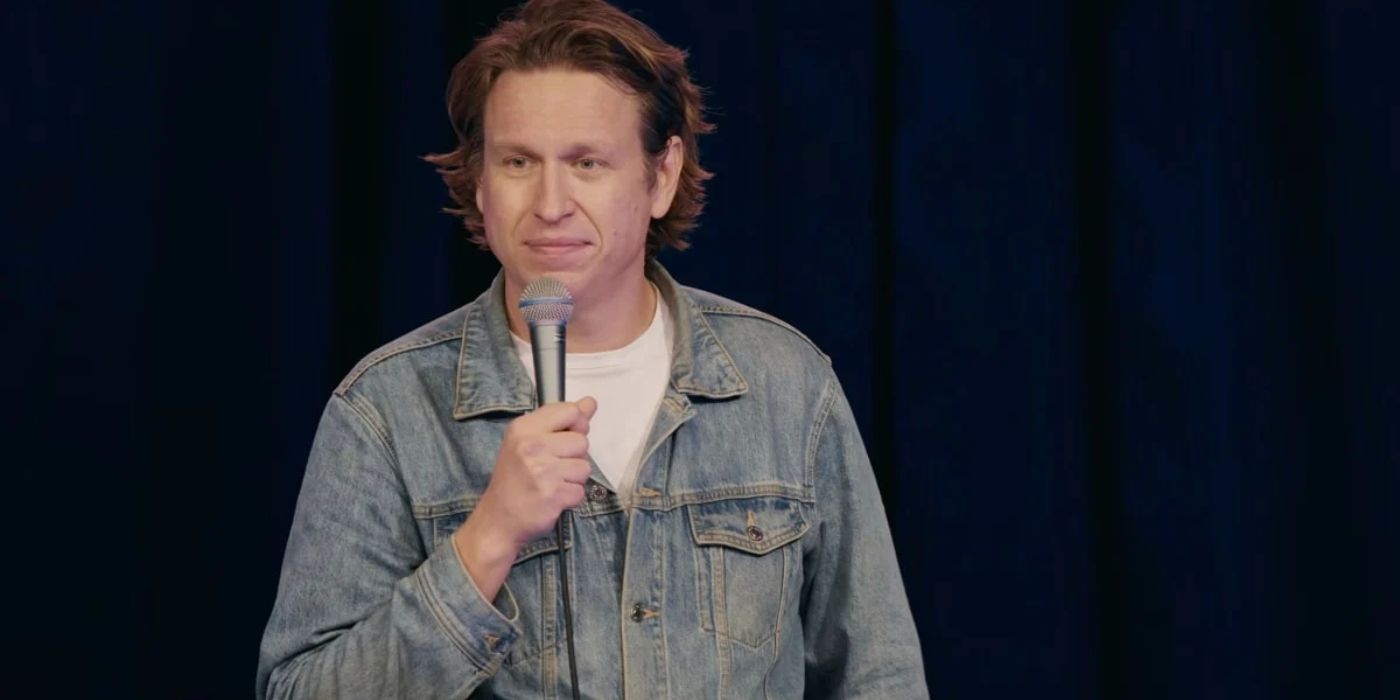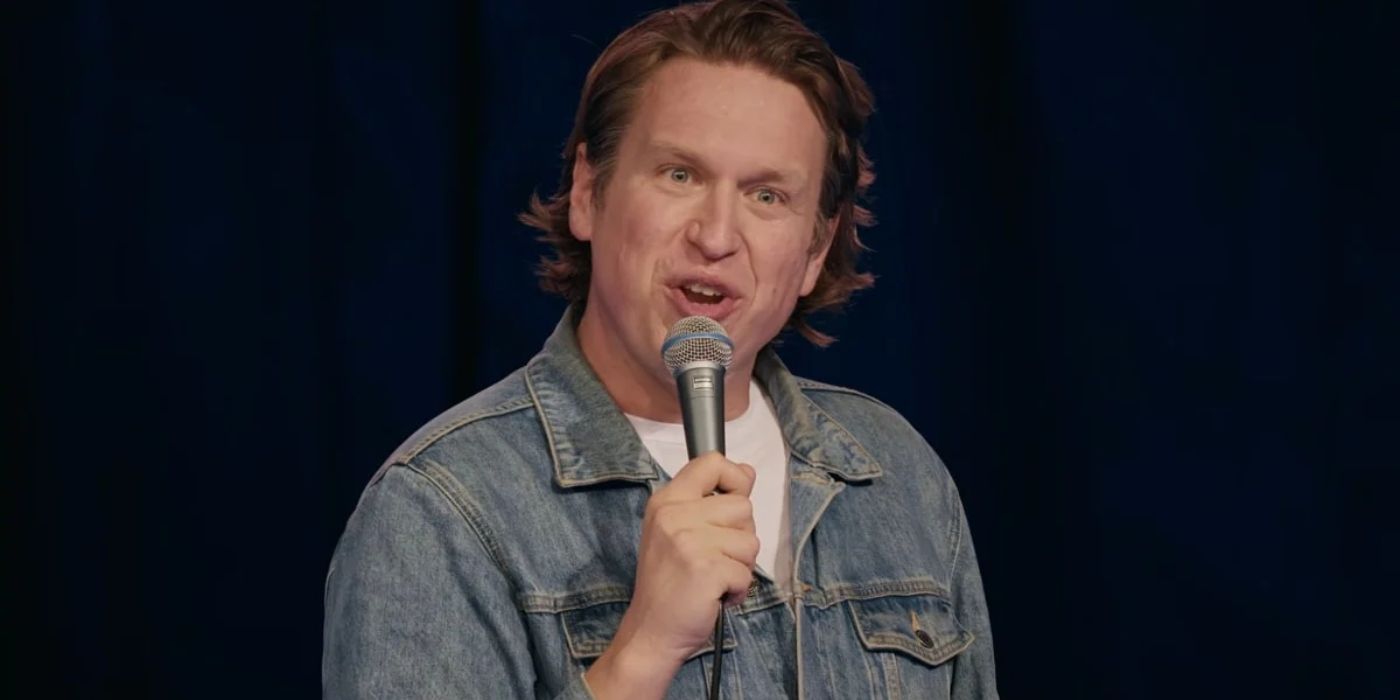The Big Picture
- Pete Holmes' first standup special in five years, I Am Not for Everyone, is now available to stream on Netflix.
- Holmes reflects on his faith journey, acknowledging the foundation that his upbringing provided while recognizing the need for personal growth and self-inquiry.
- The comedian also discusses the impact parenthood has had on his material, why the special is called I Am Not for Everyone, and the possibility of a Crashing revival.
I've always had an awareness of Pete Holmes. That sounds odd (and potentially even a little creepy) to say, but there are a handful of unique similarities between me and the comedian-writer-actor triple-threat born and raised in Massachusetts. Chief among them is the fact that we both attended the same small, Christian liberal arts college in that state — Gordon College — an experience which Holmes humorously details in his self-professed "part autobiography, part philosophical inquiry, and part spiritual quest" Comedy Sex God.
Designated dorm room visitation hours, life and conduct statements — heck, even the on-campus improv group known as the Sweaty-Toothed Madmen — there are some aspects that are so ingrained in memory for those who came up through Gordon that it would be difficult, and in some cases impossible, to try and explain them to anyone outside that experience. In other words, you simply had to be there. But one of my starkest memories from my time there as an undergrad was watching Holmes come back to our shared alma mater to perform stand-up — in the on-campus chapel, no less.
I've distantly followed his career in the years that have followed, from his tenure on late night with The Pete Holmes Show to his semi-autobiographical scripted comedy Crashing. Now, five years after his last standup special was released in 2018, he's back with a new one for Netflix, Pete Holmes: I Am Not for Everyone, which feels like the comedian at the most fully realized version of himself. Getting to speak with Holmes for the first time via phone for what was initially supposed to be a fun, 15-minute chat about said special turned into something more meaningful than I could have anticipated. Over the course of the interview below, Holmes reflects on his own faith journey post-Gordon, how parenthood has informed his comedy, whether there's any potential for a Crashing revival, and more.

Pete Holmes: I Am Not for Everyone
- Release Date
- October 24, 2023
- Director
- Oren Brimer
- Cast
- Pete Holmes
- Runtime
- 65 minutes
- Main Genre
- Comedy
- Writers
- Pete Holmes
COLLIDER: Just on a personal note, from one Gordon alum to another…
PETE HOLMES: Whoa, no way!
Yeah! Class of 2010. I actually saw you do stand-up on campus when I was there.
HOLMES: Oh my god. That is incredible. The only thing I remember from that show — well, my brother, after the show, told me he had heard every joke before. [Laughs] And I also called [Gordon professor] Norm Jones an SOB, lovingly. "Oh, there you are, you old SOB." I remember the crowd sort of gasping, but I was like, "Uh oh! I guess I can't even say an acronym for a curse word."
I wanted to mention that just because, as somebody who grew up evangelical and went to Gordon and has since — we're going to start this interview off in deep territory — gone through the spiritual reckoning of evolving my own faith relationship, hearing that portion of your special really hit different for me than it might have for a lot of other people. I know you've talked a lot about your own journey post-growing up in that environment and sort of recontextualizing your relationship with God. This is a very long-winded way of asking: where do you see yourself now at this point in your life, in terms of your faith relationship and your belief system?
HOLMES: I sincerely empathize with a place like Gordon, meaning, I sort of joke in [the special], “Why didn't I learn this in church?” But Father Richard Rohr and Ram Dass, they all sort of make the same point, which is that you have to have a container before you can break it, you know? You have to be somebody before you can be nobody. At that time of our life and even growing up, it's possible to look back with anger at some of the fundamentalism I was raised with. But also, I sort of get it. It's not what I would do, but they're trying to give you a foundation, or a starting place. I would look at that as a starting place, and the starting place that I'm grateful for. I wouldn't say I'm bitter anymore, but I was. [Laughs]
I do think it's unrealized potential to not feel safe to tear it down and then build it back up, which is literally the cornerstone of the faith: death and resurrection. We’re all kind of jumping—now I sound like a preacher—to Easter Sunday, the oldest thing in the world, without going to Good Friday. You need that death. I think all the mystical interpretations of religions are a point of that same thing. It's not what you thought it was, and that's essential. I point this out all the time, it's not just spiritual stories that are reminding us of this. Harry Potter is a great example. Every story where a child realizes that they're of royal blood, or that their parents were wizards, or that they are a wizard, or that they are something more than they thought they were: that's the story. So you die to what you thought you were—a Muggle—and you're reborn as, I won't say a wizard, but you're reborn [and] your divine inheritance is claimed, and you start to recognize who you are.
That is the answer that I would give to that question, is that my spirituality is all about self-inquiry. What do we mean when we say “I?” What do we mean when we say “God?” What is the fundamental, most elemental aspect of Being that you share and that God is? And getting curious about that, not just as a belief system or even as a thought experiment or something that you can tell people that you believe, but because when you sink into your Being—and I would capitalize that Being, like a simple place of “I am” or awareness—your fear and your anxiety and your dread and your panic, they don't come. Nothing comes. It's crazy. Pete can't even come when I sink into that place. It's frustrating. Pete doesn't get to come.
Ram Dass used to make this point: if you, currently, or me, Pete, go and sit at the right hand of God, that's psychosis. You could lose your mind if you think that Pete is gonna become one with the divine, but there's an aspect of you that is. Your ego doesn't get to come along, if that makes sense. That’s why I'm grateful for — the last line of that joke is the most important line, because God is no thing. God is awareness without an object, and I think that's sort of what we're getting at when we're talking about God's love. God’s unconditional love just being almost like a field that holds and nourishes and supports all things, the ground of being. But again, that's not just so you can tell people that you believe that. It's so you can take a minute in the morning and rest in that space, or do it as you're falling asleep at night, or do it while you're driving your car, stuck in traffic. You can just kind of drop all of those identities and rest in it. And you start to realize that the peace and the happiness that you're looking for is actually the peace and happiness that you fundamentally are.
There's a line in my book where I go, “There's nothing we can do to increase or decrease the love of God, but there are things we can do that increase or decrease our awareness of that love.” So again, it's not to belong to a group, it's to have experiential knowledge to become the knowing of Yourself. And again, I capitalize that self. That is a deep place to start, but boy, I love it. I don't know why we're not talking about this constantly. I don't know why comedians, my people, my tribe, [laughs], it's so weird that we don't talk about God, and if you do people sort of roll their eyes. And I'm like, “It's the biggest joke.” Imagine if reality isn't what it appears to be, if we ourselves are not what we appear to be, if we are not scared little boys, if we are wizards, if we are of divine blood. That is the funniest joke in the world. And yet religion has burned so many of us and put a bad taste in our mouths that 99.9% of comedians take the outside table and scoff at it, and throw rocks at it, which I understand. But that's just the beginning.
Deconstruction is the first step, and it's frankly the least interesting step. Most people get stuck in deconstructing. They either get stuck in literalism and just believing what they inherited — which I understand, I did that for a long time — or they get stuck for decades deconstructing, and saying, like I say in the joke, that, “A talking snake didn't give a naked lady an apple,” and they feel that power and that rebellion. And that's an appropriate energy, I think, for a time. Give it four years; you can't do it longer than you were in college. Tear it down and burn it down, but at the end of the day, deconstruction is not the most interesting thing. Reconstruction is the only thing; that's resurrection. But people are — stay with the metaphor — they're hanging on the cross of the religion that burned them. No. Be reborn! Drop it or change it or adapt it, but you're being called to something far greater than just suffering. That's boring, and you need to get over the part of you that thinks you deserve that. It's almost like we prefer hell and individuality to heaven and what to the ego seems like oblivion.
You got me started on a strange — [Laughs] I was coming on to promote a comedy special telling wiener jokes.
[Laughs] I did want to ask you about more than this, I promise.
HOLMES: No, I love this.
Speaking of adapting and changing, a lot of the jokes this time around just feel so informed by your being a dad and a husband. I'm sure part of it is that there's so much funny stuff that happens when you're a parent, but also for you personally, how did that life stage change inform your approach to comedy?
HOLMES: Those things aren't unrelated. Becoming a parent is a death, and I mean that in a good way. It's a change, especially for a woman who really goes through that physical transformation. The part of you that is not a parent goes away and then the part of you that's a parent arrives just as suddenly as the other one left, and it is a transformation. The way that I've sort of thought about it is it's way more interesting. It's deeply healthy, especially for a comedian whose job is to sort of display his wares of his personality and his thoughts and his feelings and stuff. Left unchecked, you can become like a Gollum. You become like Sméagol [laughs], looking at the precious ring of your own intricacies, and you can become obsessed. Being in a loving relationship with Val, that certainly helps. And then a baby is a huge explosion of that, and it sort of shifts in this beautiful way. I thought I was the star of the movie, like most of us do in our youth. It's a movie about you; it fades in every morning when you wake up, it fades to credits every night when you go to bed. When you have a baby, you're like, “Oh no, I'm a supporting character.” The movie didn't even start until Lila was born.
There's a line in the movie Interstellar that says, “As a parent, it's your job to just become the memories of your child,” and that is a deeply spiritual practice, if you recognize it as such. Meaning, you surrender your ego and your needs and your wants, and my wife sacrificed parts of her body, and we're tired, and all of this stuff, but you're dropping all of this stuff that you thought was you. I thought I was me because I slept nine hours a night. Well, that went away, and then something remained, and it makes you curious about the consistent factor of your experience, but it's also way funnier. I don't mean to disparage anybody else's comedy, but the comedians that have kids or that have something outside of themselves, even if it's not a child, that is very important and consuming for them, I prefer that to jokes about weed and Xbox. That's just gonna be a preference that I have in my forties.
What I like about being a parent is how much humiliation there is, and when I say humiliation I don't really mean that in like being walked through the town square and people yelling, “Shame!” I like to point out that humiliation is the same root as humble, and it's the same root as human, and that comes from the word for soil. It means getting low, getting real, getting small, and that's what being a parent is. When you can hang up yourself and not protect yourself and not use your stand-up as a PR campaign for yourself, which is what so many of us do with our lives, is to tell people how to think about that in this positive way. Of course, I do that as well, but on stage, I prefer telling stories of ineptitude and sweatiness and failure, and that's why it's called I Am Not for Everyone. Could I have manufactured an hour of material where I am for everyone and I win in the story? Yeah, of course. But to use an alpha position, being higher than everybody—you're on stage—brighter than everybody—you're under lights—louder than everybody—you have a microphone—and to use that power to share your brokenness is deeply meaningful to me. I think that's a uniquely human art form.
All I can say is it's the comedy that I like to see, and it's the comedy that I strive to do because hopefully, ideally, everybody leaves feeling a little bit less alone — as opposed to me being like a Crest commercial. “And that's how I won. And that's what I did with my money and my power and my car.” Then I'm just another advertisement, as opposed to saying, “No, the you that came to the show now, that one's okay. The you that's not for everybody, that's okay.” And because we started on a spiritual bent, that's how I'm feeling. The universe thinks that's okay. You belong. It belongs. We define each other. The awkward person at the party defines and gives reality to the suave person at the party, and they need each other, and everybody fits and everybody belongs.
This is the first standup special that you've done in a minute, but I know the pandemic was sort of a factor, and you acknowledge that, too, in the special. Being in front of a crowd again, being in a space with people. Had you wanted to film something sooner, and then it got delayed?
HOLMES: That’s exactly what happened. Right around March of 2020, I was getting ready to film the hour. The venue wasn't picked, there was no network or anything, but I was making those calls, being like, “I feel like it's ready. Let's do it.” It's such a gift to me that it got delayed. The pandemic wasn't great. The suffering of that was horrible. But just strictly speaking about the process of putting this together, the delay ended up being really good for me. Comedians always have to fight against and sort of manage their own mania, meaning you think it's ready.
When I came back after the lockdown and we all sort of had to have our training wheels back on and learn how to do it again, I started writing much more interesting jokes. My daughter was older, I had more rich experiences, and then I ended up using 30 minutes from the old one. The rest was this newer stuff that was informed by my daughter getting older. It was informed by, honestly, the urgency and the mortality and the vulnerability that that experience gave all of us, gave the art. It made the special what it is. Now I sort of — I wouldn't say shudder to think, but part of me does, that I could have filmed it when, really, it would have been fine, but it needed that time. I just didn't know it. It was complicated, the whole experience, for all of us, but I'm glad that it disrupted the process because I think I would have filmed it before it was ready. And the result of it is, this is my favorite special that I've done. There's a certain richness to it that if I hadn't been interrupted, I wouldn't have taken the time to refine it.
As TV editor, I would be remiss if I didn't ask you about Crashing. I remember conversation around the time of the finale about how there was potential in the future for a continuation of some kind, whether as a film or something else. We're also in this interesting era of revivals now; we're seeing shows maybe not brought back permanently or long-term, but as a nice little button to close. I don't know if there's anything you can talk about in terms of the possibility of that happening, but I'm sure people would love to know.
HOLMES: Oh, that's so sweet. Honestly, I'm not just saying that. That really is cool that people would be interested in that. When HBO canceled it, they did say that they were open to doing a movie. I've been watching so much Chappelle lately, and I just admire how honest he is. [Laughs] So, the whole honesty is, it really felt done — not just as a show, but it's really hard, harder than I thought, to write scenes with actors who look a little bit like your parents pretending to be your parents, saying things your parents said, with an actress pretending to be your ex-wife, artistically recreating moments that were based on reality. And just the schlep of it was crazy, being in a trailer parked on West Fourth Street. In a certain sense, I can see the glamour of it. Oh my god, we're shutting down half a block of the Village and that's cool. But also, I'm just a tall man in a very small camper, and people are knocking on the door… [Laughs]
Sometimes people don't believe me, but when it ended, I was good with it. I felt we shot a version of the finale—there were two versions, one where I kiss Ali, and one where I don't — and we aired the one where I kissed her because we were like, "I think this might be the last moment. This might be it, so let's just shoot it as kind of a Hollywood ending. They're together and they love each other and all that." When HBO said the movie, I didn't really consider it, meaning, it just felt like the story was done. We had talked about Season 4, and we were like, “What happens? Well, Pete gets a talk show, Conan [O'Brien] gives him a talk show.” I was like, “Then the show should be called Flourishing,” you know what I mean? It's not Crashing anymore. What I like about the show as a piecemeal, as three seasons, is it's an exploration, an as-honest-as-we-could-do exploration.
It's what it's like starting in comedy, and that's what it's like for 10/15, sometimes 20/25 years it’s like that. There wasn't a show that was for that and about that, and as soon as I start succeeding, it's like a soft man's Entourage, you know what I mean? I didn't wanna do that. And also, I physically didn't wanna do that. When Insecure took time off, when Issa [Rae] was like, “We're gonna take time off,” I was like, “I hear that! I understand.” It's a year-round job, and it's a privilege. It feels like flying international for a year. [Laughs]
As a fellow person over 6 feet tall, I understand the reluctance to not want to put yourself in a tiny trailer or be stuck on planes going back and forth, because legroom is the bane of my existence on most flights.
HOLMES: Oh my god. And also, Val was pregnant that last season, and then we had Lila. Just like I was saying, the show is literally not about me anymore. But boy, I'm glad. Judd and I are still close friends, which is surreal to say because he's such a hero of mine. A lot of people from that show, Jamie Lee and I are still close. I still talk to Beth Stelling — love her—Judah [Miller], Oren [Brimer], Yoni [Weinberg]. Oren, we just did the Batman videos together. Anyway, we're all like a crew and it's wonderful. I'm always sort of open to the idea of doing something with Judd again because I know, now that time has passed, there is an interest for us just as friends to work together in that space. So, we'll see.
Pete Holmes: I Am Not for Everyone is available to stream on Netflix in the U.S.



